 Petzlover
Petzlover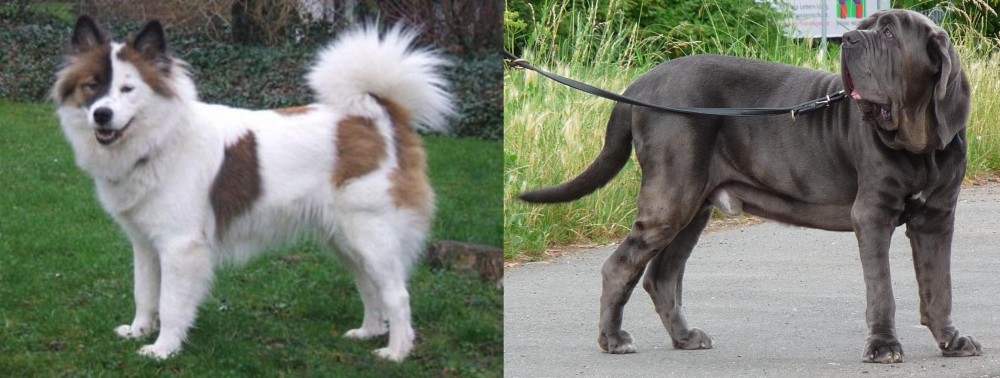 Elo is originated from Germany but Neapolitan Mastiff is originated from Italy. Elo may grow 10 cm / 3 inches shorter than Neapolitan Mastiff. Elo may weigh 44 kg / 97 pounds lesser than Neapolitan Mastiff. Elo may live 7 years more than Neapolitan Mastiff. Both Elo and Neapolitan Mastiff has almost same litter size. Both Elo and Neapolitan Mastiff requires Moderate Maintenance.
Elo is originated from Germany but Neapolitan Mastiff is originated from Italy. Elo may grow 10 cm / 3 inches shorter than Neapolitan Mastiff. Elo may weigh 44 kg / 97 pounds lesser than Neapolitan Mastiff. Elo may live 7 years more than Neapolitan Mastiff. Both Elo and Neapolitan Mastiff has almost same litter size. Both Elo and Neapolitan Mastiff requires Moderate Maintenance.
 Developed in Germany in 1987, the Elo is a fairly new breed and there are some unique situations surrounding its development. For one thing the Elo Breeding and Research Association has trademarked the breed name, Elo. The use of the name is supervised by the Elo Breeding and Research Association. Secondly, the goal in developing the Elo is the make the best possible pet for a family. The Elo is bred for behaviors rather than appearances, for companionship rather than work.
Developed in Germany in 1987, the Elo is a fairly new breed and there are some unique situations surrounding its development. For one thing the Elo Breeding and Research Association has trademarked the breed name, Elo. The use of the name is supervised by the Elo Breeding and Research Association. Secondly, the goal in developing the Elo is the make the best possible pet for a family. The Elo is bred for behaviors rather than appearances, for companionship rather than work.
The Elo was developed when Marita and Heinz Stories crossed Old English Sheepdogs (Bobtails) with their Eurasiers. They believed that these two breeds were similar in type and development. They were looking to breed a great household pet. The litters from these original crosses were then bred again with Eurasiers or Chow, Dalmatians, and Samoyeds. This expanded the donor base and they continued to breed for character using just the Eurasier, Chow and Bobtail (Old English Sheepdog). Currently there are about 3000 dogs and 60 breeders of Elos. The breed is not really known outside of Germany but that is slowly changing.
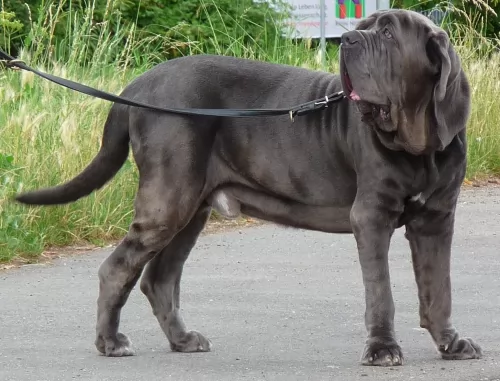 An ancient breed, the Neapolitan Mastiffs are massive dogs with a history of protecting their family and their property. The breed has deep rooted protective instincts and they are very frightening in appearance. The Neapolitan is of the Molosser group of dogs, all of whom probably came from the same line. It is known that all the mastiffs in Europe are descendants of the Tibetan Mastiff. The Tibetan Mastiff is considered the most ancient of all canines.
An ancient breed, the Neapolitan Mastiffs are massive dogs with a history of protecting their family and their property. The breed has deep rooted protective instincts and they are very frightening in appearance. The Neapolitan is of the Molosser group of dogs, all of whom probably came from the same line. It is known that all the mastiffs in Europe are descendants of the Tibetan Mastiff. The Tibetan Mastiff is considered the most ancient of all canines.
The Asian Mastiffs came from India to Greece around 300 BC with Alexander the Great. Then the breed was brought to the Romans by the Greeks and then introduced them in their circus in fights. Another possibility is that around 500 BC the mastiffs came to Britain from the Phoenicians. Either way the Roman Molossus is the ancestor of the Neapolitan Mastiff.
The Romans crossed the breed with the English Mastiff around 55 BC and developed a premiere war dog that was called a Mastini.
The breed eventually became extinct in Europe with the exception of Campania. The breed was recognized in 1946 with the standard accepted in 1949. However, it is believed that the Neapolitan Mastiff has been continuously present in Campania for over two thousand years. The breed was initially developed as war dogs and for the Roman coliseum spectacles.
In 1946 Dr. Piero Scanziani established a program to breed them in Italy. He wrote the breed standard in 1949.
Today the Neo is a farm dog, an army dog, a police dog and a guard dog. They were shown in Italy for the first time in 1946 but only in 2004 was the breed recognized by the American Kennel Club (AKC). It was 1973 when the Neapolitan Mastiff Club of America was born and 1996 when the standard was approved by the AKC. They are still a rare breed in the United States.
 As previously mentioned the Elo is bred for behaviors not appearance and not work. Therefore, the appearance of any one dog can vary greatly. There is a breed standard but there is also a lot of diversity in the breed. The Elos’ body is longer than it is tall and it tail is full and furry. He carries his tail over his back in a curve. The Elo has furry, slightly rounded, wide set ears. The undercoat is dense, and the top coat length can be medium or short.
As previously mentioned the Elo is bred for behaviors not appearance and not work. Therefore, the appearance of any one dog can vary greatly. There is a breed standard but there is also a lot of diversity in the breed. The Elos’ body is longer than it is tall and it tail is full and furry. He carries his tail over his back in a curve. The Elo has furry, slightly rounded, wide set ears. The undercoat is dense, and the top coat length can be medium or short.
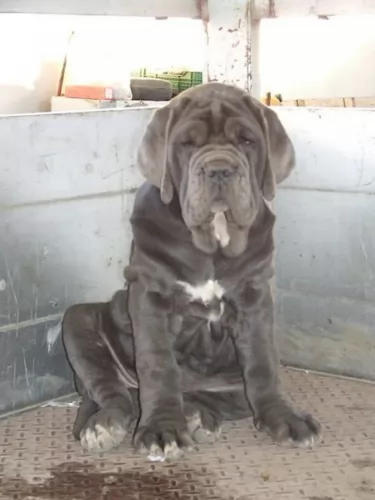 The Neapolitan Mastiff is a massive dog , so powerful and very intimidating in his looks. With an incredibly large head and hanging folds and wrinkles, the Neo is an impressive animal. His inner nobility and dignity is evident in his stance and the way he holds himself. He is relaxed, calm, quiet yet imposing none the less. His coat is dark whether black, tawny, gray or mahogany. He is muscular beyond imagination. The Neo is 10-15% longer than he is tall.
The Neapolitan Mastiff is a massive dog , so powerful and very intimidating in his looks. With an incredibly large head and hanging folds and wrinkles, the Neo is an impressive animal. His inner nobility and dignity is evident in his stance and the way he holds himself. He is relaxed, calm, quiet yet imposing none the less. His coat is dark whether black, tawny, gray or mahogany. He is muscular beyond imagination. The Neo is 10-15% longer than he is tall.
On his massive head his eyes are deep set and covered by his eye lids that droop. His eyes are blue as puppies then dark and coordinated with his coat. and his nose is large and the color of his coat. Ears are natural or can be cropped, and they carry their tail straight and curving back. The Neo has round paws and arched toes.
 Having been bred to be a companion animal, the Elo loves children, is loyal, playful, obedient and calm. They love to and need to be with their people. These are not independent, think on their own dogs. They depend on their people in order to be happy and well behaved. He is outgoing and friendly with people.
Having been bred to be a companion animal, the Elo loves children, is loyal, playful, obedient and calm. They love to and need to be with their people. These are not independent, think on their own dogs. They depend on their people in order to be happy and well behaved. He is outgoing and friendly with people.
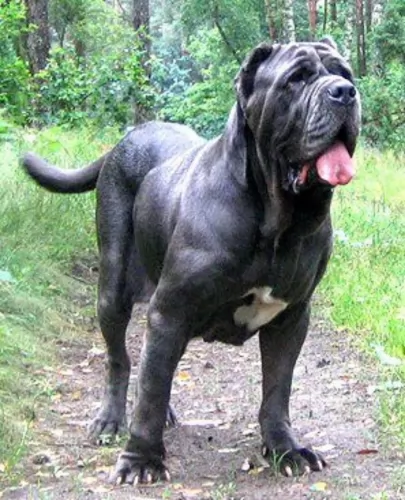 Older children in their family. No toddlers or strangers.
Older children in their family. No toddlers or strangers.
Protective yet quiet, calm, relaxed
No they won’t adapt well to apartment living or to strangers.
They are intelligent and trainable but must be socialized and know the human is the alpha or they will take over.
 At this point in time the Elo breed is very young and has a very small population, so the breeding group is small and probably inbred. This can lead to hereditary diseases and the Elo is not immune. However, they are a healthy breed and it seems the major issue is Disticha – an eye disease that causes corneal damage. It causes corneal ulcers, inflammation, scarring and tearing. There are a variety of treatments including surgery
At this point in time the Elo breed is very young and has a very small population, so the breeding group is small and probably inbred. This can lead to hereditary diseases and the Elo is not immune. However, they are a healthy breed and it seems the major issue is Disticha – an eye disease that causes corneal damage. It causes corneal ulcers, inflammation, scarring and tearing. There are a variety of treatments including surgery
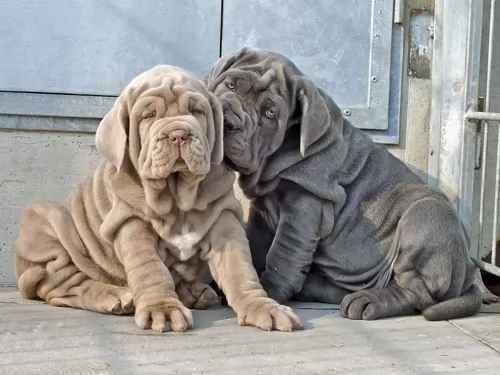 The Neapolitan Mastiff is prone to many of the same issues as any massive, extra large breed. The most common of these is Cherry Eye.
The Neapolitan Mastiff is prone to many of the same issues as any massive, extra large breed. The most common of these is Cherry Eye.
 The Elo is a non-working family dog so do not over feed them. Use a high quality dry food made for a medium size dog.
The Elo is a non-working family dog so do not over feed them. Use a high quality dry food made for a medium size dog.
As mentioned previously the Elo breed is so young as a breed that there have been very few health studies and the only inherited issue at this time besides the Disticha.
Even though the Elo is a non-working dog, they do require a substantial amount of exercise daily. They need outdoors space to run and play as they are very playful with their family. He loves to go on walks, to run, play and dig. Yes, he can be a digger if he is not provided with appropriate and alternative exercise. Without exercise the Elo can be irritable and display behavior issues.
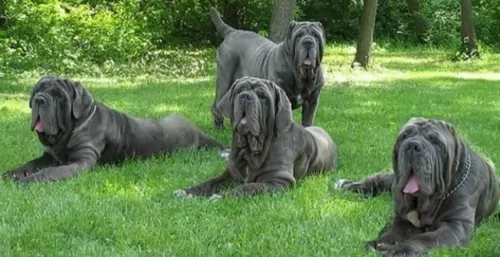 Neapolitans grow fast and so don’t overfeed when they are young. Lower protein and higher fat content.
Neapolitans grow fast and so don’t overfeed when they are young. Lower protein and higher fat content.
Don’t overfeed the adult as they can become obese.
This big hearty breed needs exercise but not too much. They overheat easily. The puppy will push himself, so you have to make sure he doesn’t over do it. No tug of war games. They need a long walk twice every day.